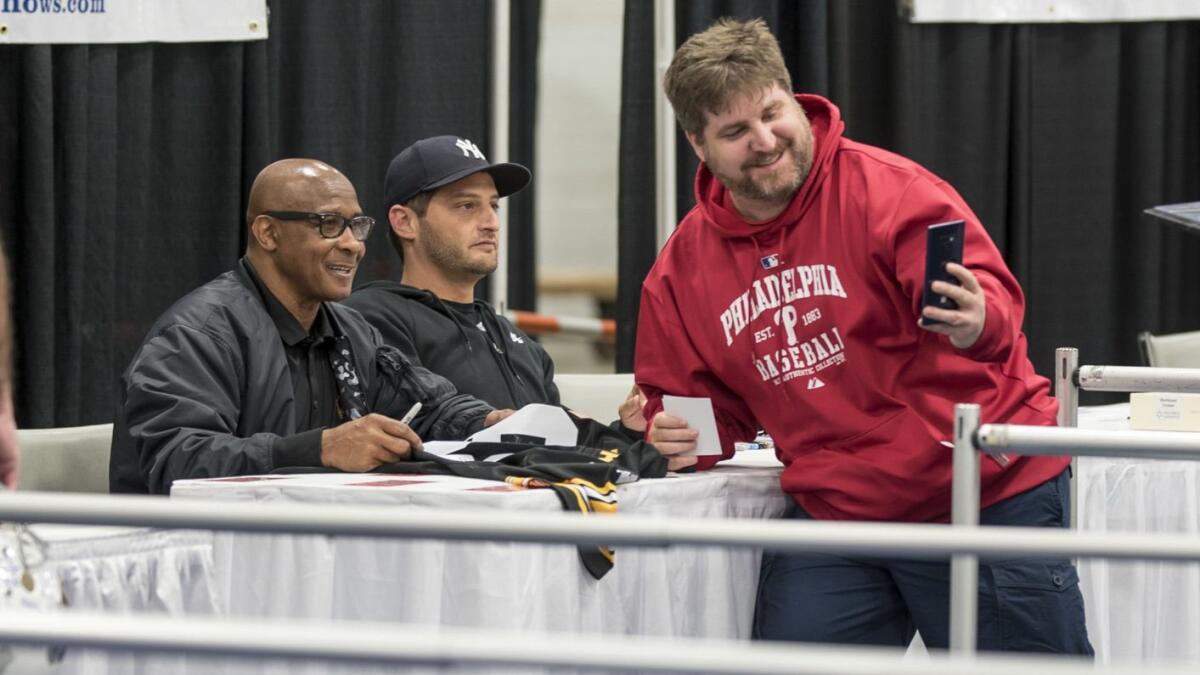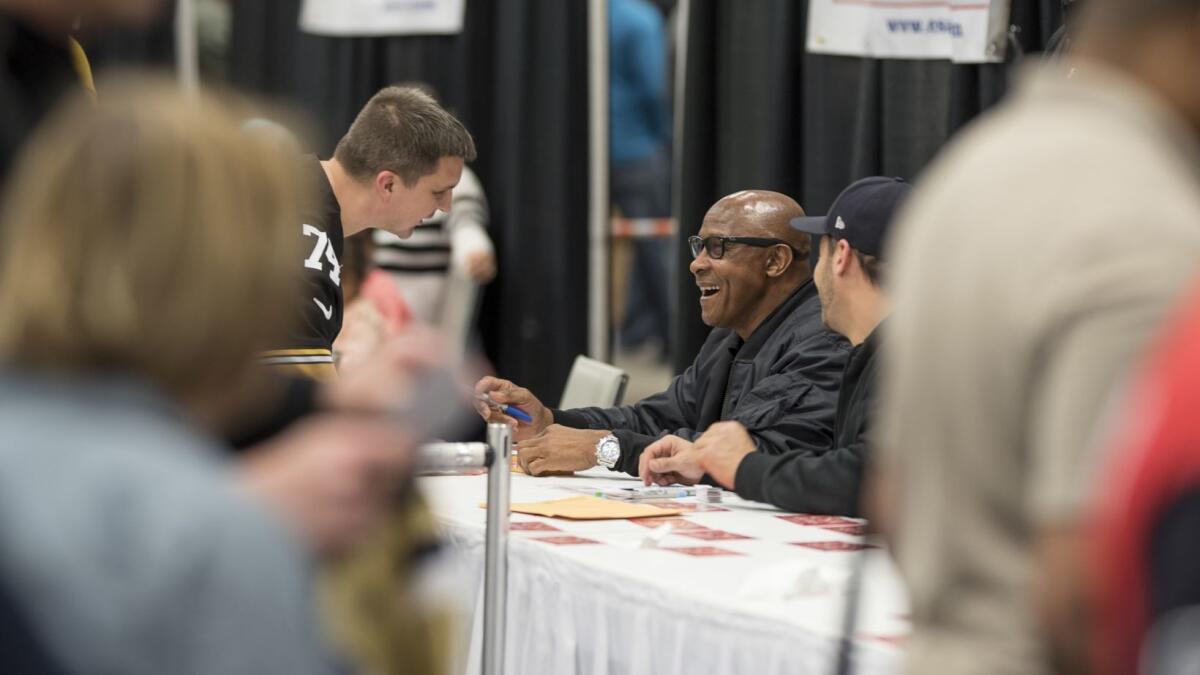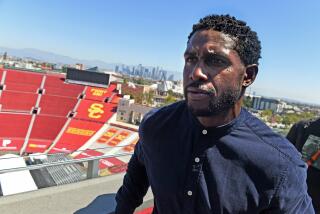USC’s Lynn Swann spends a Saturday in Virginia signing autographs for money

Reporting from Chantilly, Va. — Back in Los Angeles, the struggling football program was holding a spring scrimmage. The disappointing men’s basketball team was sitting out March Madness. The athletic department was coping with the ongoing fallout from the college admissions bribery scandal that already has resulted in the indictments and subsequent firings of the school’s water polo coach and a senior administrator. And trustees and senior leaders were discussing university governance issues at a retreat in nearby Santa Barbara.
Meanwhile, USC athletic director Lynn Swann was more than 2,600 miles away, signing autographs for money.
Along with Randy Moss, Emmitt Smith and the actor who played the unmasked variation of mass murderer Jason Voorhees in the horror film “Friday the 13th Part 2,” Swann was among more than a dozen sports and entertainment celebrities who appeared Saturday at a memorabilia show held in the suburbs of the nation’s capital.
Dressed in black, Swann sat behind a folding card table inside a drab, fluorescent-lit exhibition hall for nearly two hours — laughing and smiling, shaking hands and posing for pictures, making small talk and paying extra attention to a toddler in a Pittsburgh Steelers onesie.
Mostly, Swann signed stuff, running his Sharpie across football helmets and jerseys and red seats rescued from Pittsburgh’s demolished Three Rivers Stadium, over and over again, all for fans and collectors who paid $220 and up for the privilege.
A USC spokesperson said Swann had been invited to the Santa Barbara retreat but was not required to attend, and that there was nothing critical on the agenda related to him.
A different spokesperson, from the USC athletic department, said Swann booked the autograph show months ago, that his invitation to the retreat was a courtesy, and that he had discussed not attending with former university interim president Wanda Austin.
For former USC linebacker Riki Ellison, images of Swann’s appearance that subsequently were posted on social media raised a question: During a time of crisis for the school’s athletic department, why would the person in charge be all the way across the country just to pocket a few extra bucks?
“I couldn’t believe it,” said Ellison, a member of USC’s 1978 national co-championship team who runs the Missile Defense Advocacy Alliance, a Virginia-based nonprofit. “Lynn’s a good guy, but isn’t his salary in the millions? Why does he need to do this? It’s just embarrassing.”

Cashing in
Autograph shows can be a lucrative source of income. In the late 1980s, Joe DiMaggio and Mickey Mantle were paid as much as $30,000 each for two-day signing appearances; today, in-demand athletes can command fees that reach six figures for a few hours of work.
Organizers for the Virginia show declined to disclose Swann’s appearance fee. Ben Litvin, a talent and marketing agent who show organizers said managed Swann’s booking for the show — and also has worked with Heisman Trophy winners, including O.J. Simpson — declined an interview request.
Celebrity booking websites list Swann’s appearance rate for motivational speeches and corporate meet-and-greets as ranging between $20,000 and $50,000.
“My understanding for these shows is that the athletes get paid by the promoter in a lump sum, and then the promoter decides what to charge for the autographs,” said Bert Lehman, editor of the Sports Collectors Digest.
At the Virginia show, attendees paid $10 for admission, $220 or $250 for Swann’s signature, and $50 apiece for additional inscriptions reading “SB X MVP” or “HOF 01” — references to Swann’s most-valuable-player performance for the Steelers in Super Bowl X and 2001 induction into the Pro Football Hall of Fame.
Swann’s signature prices were the third-highest of any athlete scheduled to appear at the three-day show, trailing only Lakers legend Kareem Abdul-Jabbar and retired Dallas Cowboys running back Smith, who charged as much as $270 and $285, respectively.
Former San Diego Chargers tight end Kellen Winslow, a Hall of Fame member who signed at the same time as Swann on Saturday, charged $40 for his signature.
Memorabilia dealer Ron Hartford, who had a merchandise booth at the show and planned to have Swann sign a pair of Steelers helmets for subsequent resale, said Swann’s prices were high for two reasons: Pittsburgh has a large and loyal fan base, and Swann doesn’t attend autograph shows very often.
Show attendee Denny Shaffer, a 40-year-old truck driver and Steelers fan from Chambersburg, Pa., said he had been attempting to obtain Swann’s autograph for nine years. An online search indicates that Swann’s last public autograph signing took place at a 2014 show in Chicago.
“It’s supply and demand,” said Hartford, who owns an online store called Gridiron Autographs. “Some players’ agents pretty much whore them out, but it’s smart business to limit the amount of times that they sign. [New England Patriots quarterback] Tom Brady only signs once or twice a year, and never does public shows. His price is through the roof.”
Swann has a history of cashing in on his celebrity. In a 1999 lawsuit, Swann claimed that the organizer of a Steelers reunion event failed to pay him the full $100,000 he was promised in exchange for signing 3,000 autographs.
During Swann’s unsuccessful run for governor of Pennsylvania in 2006, he reportedly sold autographed footballs, photographs, mini-helmets, and plaques though an eponymous website for prices ranging from $125 to $225. (According to the site, a portion of the proceeds went to Big Brothers/Big Sisters and the Pittsburgh Ballet.)
Last year, Swann told the Wall Street Journal that the NFL paid him in 2014 to give interviews supporting a now-defunct Federal Communications Commission rule that banned cable and satellite providers from showing NFL home games that weren’t sold out when the league blocked local broadcasts of those games.
Swann also signed his name to cover letters that were attached to 21,000 letters sent to the FCC urging it to keep the rule. The Journal later determined that many of those letters — purportedly from concerned citizens, but signed by the likes of “Bilbo Baggins,” “Swim Shady,” and “Sonny Hedgehog” — were fake.
“The program is unraveling”
Ellison, the former USC player, said Swann exercised poor judgment by attending the show.
“The program is unraveling,” said Ellison, whose son Rhett also played football at USC and was the team’s captain in 2011. “We’re losing our culture. We have to try to get that back.
“With all of the issues going on right now, why would anybody support this brand or donate money to this school or send their child to this school? If you’re Lynn Swann, how does [going to an autograph show] gain additional credibility for USC?”
Since his April 2016 hiring, Swann’s tenure as athletic director has been marked by on-field inconsistency and off-field controversy.
The school’s flagship football program won the Rose Bowl in 2016 and a Pac-12 Conference title in 2017, but last season failed to live up to a No. 15 preseason ranking by the Associated Press and finished 5-7, its first losing record in 18 years.
Swann’s decisions to extend coach Clay Helton’s contract through 2023, made before the 2018 season, and to not fire Helton following a season-ending loss to longtime rival Notre Dame that drew the smallest crowd to a Trojans-Fighting Irish game at the Coliseum since 1960, have been questioned by boosters, alumni, fans, and other college sports observers.
Swann also has drawn criticism for his December decision to remove USC’s Song Girls, the iconic, white-sweater-wearing spirit group, from performing at men’s basketball games.
The Trojans finished the basketball season 16-17 and missed the NCAA tournament under coach Andy Enfield, who in 2017 received a contract extension through 2023.
Tony Bland, the former USC basketball associate head coach, was arrested by FBI agents in 2017 and pled guilty in January to a bribery charge in connection with the federal probe into college basketball’s underground economy. He is scheduled to be sentenced in May.
Prosecutors alleged that Bland accepted money to steer players to use a sports management company and financial advisor when they turned professional, and also alleged that he directed a combined $9,000 in payments to associates of USC player De’Anthony Melton and recruit Taeshon Cherry.
In a separate investigation, federal prosecutors last month accused USC senior associate athletic director Donna Heinel and men’s and women’s water polo coach Jovan Vavic of accepting a combined $1.55 million in bribes to facilitate the acceptance of more than 24 nonathletes into the school by faking their status as recruited athletes.
Two former USC soccer coaches, Ali Khosroshahin and Laura Janke, also are among the 50 people who have been charged in the wide-ranging scandal, which centers around allegations that Newport Beach-based college admissions counselor William “Rick” Singer bribed school employees and facilitated exam fraud to help the children of wealthy individuals gain admission to several elite college and universities.
USC fired Heinel and Vavic. Swann told The Times that he was “blindsided” by the alleged misconduct.
“If you’re saying that you’re blindsided, then you’re not competent about what is going on in your own department,” Ellison said.
“A good day”
None of USC’s issues mattered to Shaffer, who eagerly was anticipating Swann’s appearance at the Virginia show.
Scrolling through photos on his smartphone, Shaffer showed off his collection of 87 autographed jerseys and what he said was the “second-largest confirmed Terrible Towel collection in the world.”
“I could be working today for $39 an hour,” he said. “But I passed on that to be here. I have to get [Swann’s] jersey signed.”
During his allotted signing period, Swann was stationed behind a row of card tables cordoned off by metal barricades and only accessible to attendees who paid extra for autographs.
Gregg Price, a 44-year-old paraeducator for special-needs children from Olney, Md., paid $245 to have Swann sign and inscribe an 18-by-20 inch photographic placard.
Price was holding an empty box of Milk Duds candy, which he said he discussed with Swann.
“I grew up in Pittsburgh, and when I was a kid I went trick-or-treating at Lynn Swann’s house,” Price said. “He came to the door and gave me Milk Duds. After all this time, I thought, ‘Wouldn’t it be cool to meet him?’ It was a good day. It’s off my bucket list.”
Jeremy Crandall, a 38-year-old from Newport News, Va., was similarly excited to meet Swann. Clad in a black Steelers jersey, he said he spent $225 on a replica helmet, $250 for Swann’s autograph, $100 for a pair of extra inscriptions, and $100 for a glass helmet case featuring “UV protection.”
“I could have gone online to buy this, but to have the opportunity to meet him was a big deal,” Crandall said. “I was so nervous that he would smudge [his signature]. And I didn’t know how he would be — some of these athletes are jerks. But Lynn Swann was not that. He was great, one of the better interactions I’ve had.”
After signing his final autograph, Swann walked along a makeshift corridor to a back room where athletes were signing helmets and other memorabilia for dealers. He did not acknowledge a reporter who yelled to him from the other side of a barrier, requesting an interview.
Earlier, a show organizer had agreed to pass a handwritten interview request with the name and professional affiliation of a Los Angeles Times reporter to Litvin, Swann’s booking agent. The organizer later returned the sheet of paper, which carried a handwritten response.
“Thanks,” it read, “but no thanks.”
UPDATE: Swann posted a response to this report on USC’s website on Tuesday.
Times staff writers Brady McCollough and Harriet Ryan contributed to this report.
More to Read
Go beyond the scoreboard
Get the latest on L.A.'s teams in the daily Sports Report newsletter.
You may occasionally receive promotional content from the Los Angeles Times.






